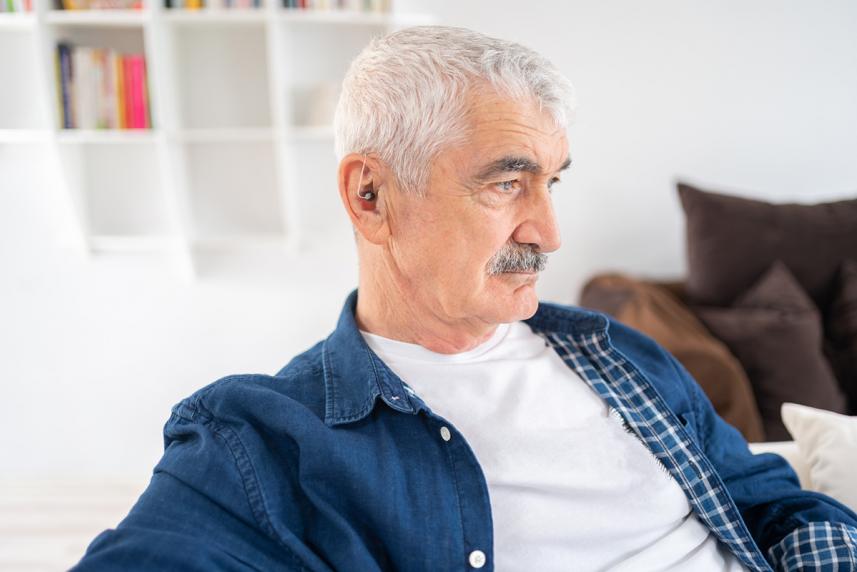
It may be time to get your hearing tested.
The ability to hear clearly may keep your brain sharper and lower your risk of dementia and depression. Find out how hearing well affects your mind.

You already know how important your sense of hearing is. Without it, it’s nearly impossible to talk with the people you love. Or binge watch your favorite shows. Or go to a concert. Or relax outside as the birds sing.
In short, hearing well is key to a good quality of life. But it’s also essential for your health — especially your brain. Hearing well helps keep you mentally sharp in many ways, explains Anish Thakkar, Au.D. He’s the director of audiology and founder of the Los Angeles Center for Hearing and Balance.
Curious about exactly why hearing well is good for your brain? Read on to learn about this powerful connection.

Many people lose their hearing gradually as they age. About 10% of adults ages 55 to 64 have disabling hearing loss. That number increases to 55% once people reach 75 years old.1
We all experience cognitive decline as we get older. But new research suggests that hearing loss, especially when it’s left untreated, is linked to a greater chance of dementia, Thakkar says. That’s probably due to a lack of stimulation to the auditory cortex, he explains. This is the part of your brain that processes and assigns meaning to sounds.
But there are other reasons why hearing loss can affect your thinking and memory:
Your brain may shrink. When their hearing declines, some people may experience faster brain atrophy, according to Johns Hopkins Medicine.2 Atrophy is when the brain starts to shrink because it loses cells.
Your brain may get tired. When you can’t hear well, your brain has to work harder to process the same information. That may put stress on the brain and lead to something called listening fatigue.3
Not only do you feel exhausted because your brain is working so hard — the strain of listening can take away from other brain functions. These include memory and the ability to focus on more than one thing.2, 3
You may become more isolated. When you can’t hear well, you may avoid group activities where you know it will be hard to hear. For example, some people may stop going to restaurants with friends. Or they might say no to family events and work parties.
But avoiding other people can lead to social isolation, which raises the risk of dementia, Thakkar says.
You may even become depressed. Another issue with social isolation? It can raise the chances of developing depression. Depression is common among people with hearing loss.4 And depression doesn’t only affect your mood. It can also affect your ability to think clearly and can even lead to a decline in thinking skills.4
In fact, a study found that even mild hearing loss can double a person’s risk of dementia. And moderate hearing loss can triple the odds.2
Luckily, there are things you can do that can help prevent this decline in memory and thinking skills.
The first step is to protect your hearing. If you suspect you have hearing loss, schedule a hearing exam and consultation with a hearing care professional. They can test your hearing and recommend the best ways to treat any hearing loss you have.
Did you know that many hearing benefits, including a hearing exam and consultation, are covered through EPIC Hearing Healthcare? Learn more.
Hearing aids are typically recommended for hearing loss, Thakkar says. And the sooner you get them, the better. But many folks with hearing loss wait up to 10 years before they get help.2
If that’s you, you may be losing out on a major benefit of getting hearing aids. Older adults who have hearing loss and are at risk of dementia could cut that risk almost in half. How? By wearing hearing aids regularly and consistently, according to a study by the National Institutes of Health.5
How can hearing aids slow cognitive decline so dramatically? “For starters, hearing well helps maintain meaningful conversations and connections with our family and loved ones,” Thakkar says. You can take part in the things you enjoy doing, like going to sporting events with friends or volunteering.
Staying engaged in your world helps you feel less lonely and isolated. It may also help give you a sense of well-being and meaning, which helps protect against depression.
Plus, improving your hearing means you’re not taxing your other senses, especially your eyes, explains Thakkar.
Your brain needs to work harder when you have to focus so closely on someone’s face to understand their words, he says. That may take away your ability to solve other problems or complete other tasks. “These tasks could range from responding to a question, remembering a fact, or deciding what to order at a restaurant,” he adds.
Many people with hearing loss simply don’t use hearing aids. Among older adults ages 70 and older, it’s 1 in 3. And only about 16% of adults ages 20 to 69 who could benefit from hearing aids have actually used them.1
Many people feel embarrassed about hearing aids. But Thakkar points out that many of today’s hearing aids aren’t noticeable at all, even to your closest friends.
Plus, once you start wearing them, you’ll be able to hear and understand better what others are saying. That will help boost your confidence, which is something your friends will notice.
Even better, you’ll be doing your brain, and your quality of life, a big favor.
Sources
Information is for educational purposes only and is not a substitute for the advice of a licensed medical provider. Consult your provider prior to making changes to your lifestyle or health care routine.